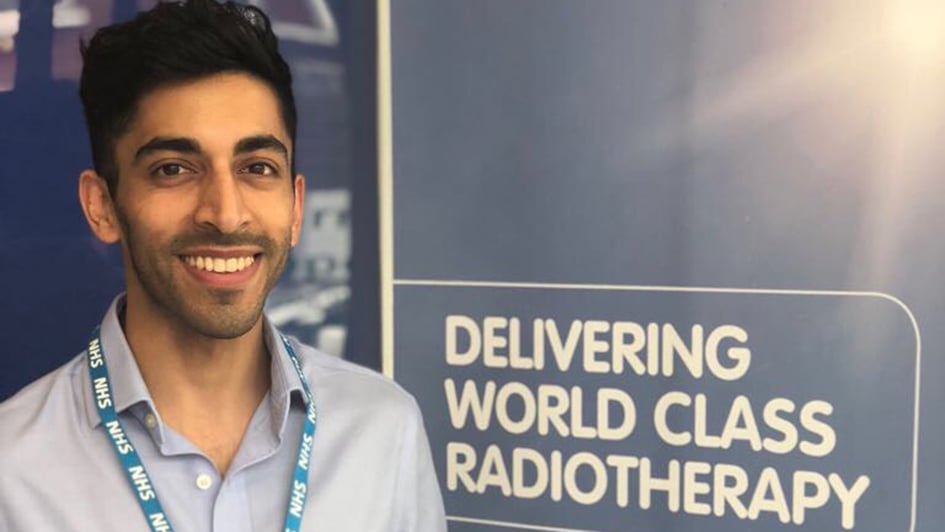
Image: Dr Sumeet Hindocha
Starting out on the journey of speciality training to become a consultant in oncology is really exciting, but it’s also a significant adjustment.
As a junior doctor working in general medicine, most of your time is spent caring for patients who have been admitted to hospital for various conditions such as infection or a heart attack.
As an oncology registrar, the rite of passage that is core medical training is finally over – but suddenly you move from feeling confident and competent at inpatient management, to a very different specialist environment with new challenges and demands.
In oncology, most of our patients are managed as outpatients and will be seen in clinic or when they come to the hospital for treatments such as chemotherapy or radiotherapy.
We need expert knowledge on the management of specific tumour-types, and during our training we move through all of the tumour types in six month rotations.
Throughout the week of 9-15 July, the ICR is highlighting our academic excellence through a series of communication activities, including news items, blog posts, and videos.
Read more
“Good company in a journey makes the way seem shorter” – Izaak Walton
Thankfully The Institute of Cancer Research’s MSc in Oncology has aided my transition into speciality training. As clinicians, it is important to have a strong understanding of the evidence on which we base our practice.
The day-release course is designed to support early clinical and medical oncology trainees with this, and it provides a solid grounding in topics such as cancer biology, pharmacology and statistics.
Modules are completed part-time during specialty training with a Postgraduate Certificate awarded after one year, a Postgraduate Diploma after two years and the full MSc after three years.
Academic Clinical Fellowships
I am also an NIHR Academic Clinical Fellow in Clinical Oncology, which means that the first three years of my training is split, to spend 75 per cent of my time undertaking clinical training and 25 per cent on research training.
Academic Clinical Fellowships support specialty trainees working in the NHS to also train as academic researchers, and these can be awarded in a number of different specialties such as Cardiology, Neurosurgery and Oncology.
We are also awarded an academic bursary to cover the costs of specialist conferences and courses related to our chosen area of research.
As an NIHR Academic Clinical Fellow in Clinical Oncology at the ICR, my clinical training takes place at the ICR’s partner hospital The Royal Marsden NHS Foundation Trust as well as Imperial College Healthcare NHS Trust and other cancer centres including Brighton and Guildford.
The course provides valuable company in the form of other trainees and lecturers. It’s a great way to meet colleagues at the same stage of training, going through the same transition, to share interesting experiences and challenging cases.
We also have the privilege of being taught by a wide range of lecturers who are experts in their fields and to hear about exciting updates in ongoing research, which for me as an Academic Clinical Fellow is particularly useful.
Cancer’s complexity
Working as a clinician in cancer is tremendously rewarding. You have the privilege of supporting your patients and their relatives through thick and thin, you hope you can help your patients to find the right treatments to help them recover – and when you can’t, you can help to buy them more time to do the things they want to do in their lives.
But despite the numerous advances we have made in diagnosis and treatment, cancer is highly complex and constantly evolving.
Through research, I hope to help not just the individual patients I treat as a clinical oncologist, but to make a much bigger difference to benefit more patients through new research discoveries and findings.
At the ICR, we offer clinicians a variety of opportunities – from a taught master's course in Oncology to fellowships providing protected time for research, and higher research degrees.
Read more
Getting involved in research
I applied for an Academic Clinical Fellowship at the ICR because I wanted to train at one of the world’s best research institutions and be a part of the exciting, cutting-edge research it delivers. I hope to develop new skills to assist me in my research career going forward such as wet-lab work, statistical analysis and computational skills.
There is a broad range of work going at the ICR and so lots of opportunities to get involved in, from advancing precision medicine, to applying big data concepts to research and developing smarter radiotherapy.
At this stage I am familiarising myself with these and other exciting areas of research through talking to other clinical fellows and PhD students about their experiences, and also by speaking to the lecturers on the MSc course – some of whom are able to offer supervision for future projects.
Everyone I have met at the ICR has been welcoming, enthusiastic and passionate about what they do – great company for the road ahead.
comments powered by